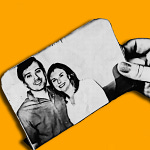When I went public about my relationship with Martin Shkreli in December 2020, I transformed into a human Rorschach test. People saw whatever they wanted to see in my story. They grafted all sorts of personal experiences, dramas and prejudices onto it. They armchair-psychoanalyzed me and convinced themselves of circular, self-aggrandizing conclusions: namely that I must be batshit insane because no woman in her right mind would so willingly invite their disapproval.
Rather than take me, then a journalist of 15 years, at my word about what happened and why I was coming forward, they looked for any excuse to not believe me. They took Martin’s near silence in the article, and his cold brush off as a sign he never cared about me — even though it was pretty strong evidence that I was telling the truth, and he was furious about it. (We always tend to get the most sore at the people we love, don’t we?)
While most of the assumptions people floated about me were wildly inaccurate, there was one thread that landed uncomfortably close to the truth: Had I wanted to “fix” Martin? And if so, was that an utterly foolish endeavor? In one of the more thoughtful observations on this theme (there were many snarky and nasty ones), a self-described Democratic pollster tweeted the day after the Elle story was published:
“Somewhat belatedly, I read the piece about Martin Shkreli and Christie Smythe. I'm not going to defend her, but if you've never been taken in by a manipulative trainwreck of a person under the delusion you could fix them, congrats on not being me.”
(I wasn’t sure what “indefensible” offense I supposedly committed in whatever fictionalized projections that were circulating on her timeline, but I appreciated her honesty.)
More times than I could count over the years, I did in fact find myself out for a run and letting the sticky, cloyingly bittersweet swells of the Coldplay song for which this section is named ooze into my brain. And I was wondering if that was what I was trying to do: fix him. I knew, at least rationally, that people couldn’t be “fixed,” but I did think it was possible to encourage them, gently, to be their best selves.
In letters and emails, Martin had told me I was a “good angel” on his shoulder. And when I visited him in prison, I could see my presence had a positive effect on his mood. Often he would go from being lost in dark thoughts and making terse and biting comments to smiling and laughing and speaking in hopeful terms about the future. He gave me credit for having this influence: “I’ll probably feel better when I see you,” he told me once in an email, after he had been distant and grumpy.
Did I feel obligated to “fix” Martin? Of course not. But did I feel like maybe, just maybe, I had the right ingredients in my personality to lead him out of a pattern of self-destruction? Ok, yes. I probably did think that. (And I also recognized I was far from the first person he had crossed paths with who had had that thought. Plenty of friends, business colleagues, lawyers and past girlfriends had taken a run at him on those grounds and failed, sometimes spectacularly.)
“You like a challenge,” a close friend of mine pointed out. She was right…in both a general and highly specific sense. Smart, ambitious men I knew, who apparently found ordinary hobbies too mundane, climbed mountains in the dead of winter…













